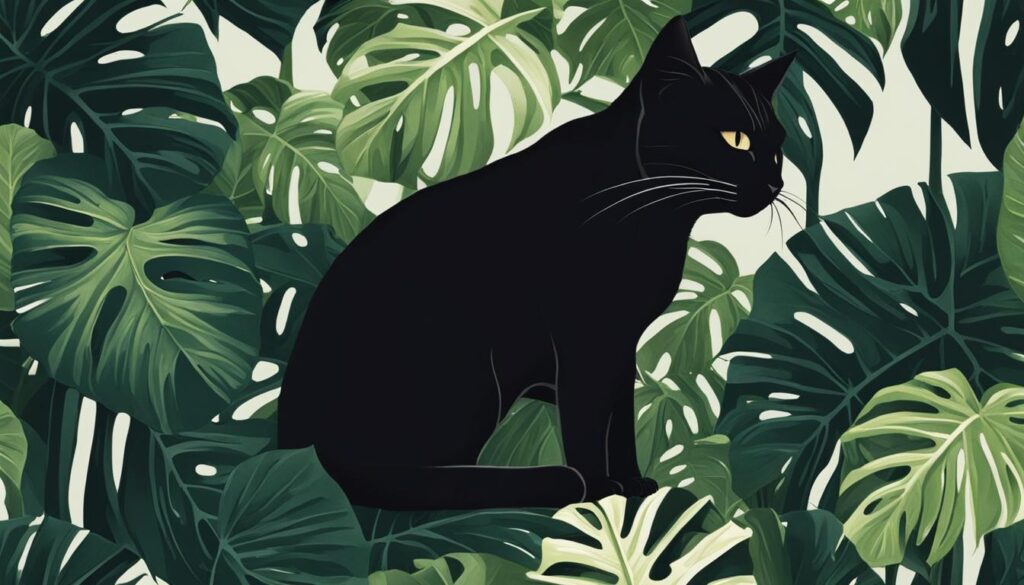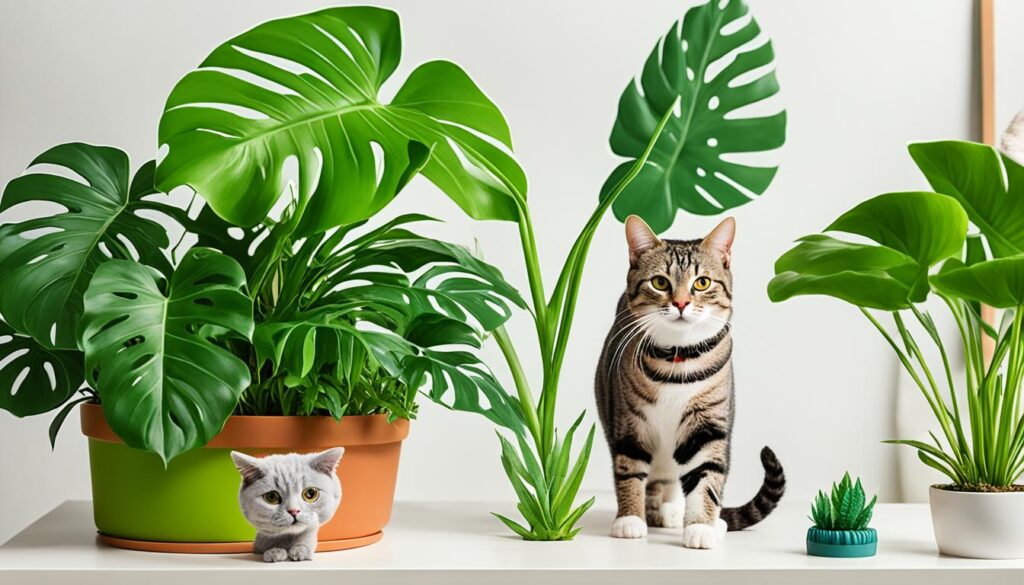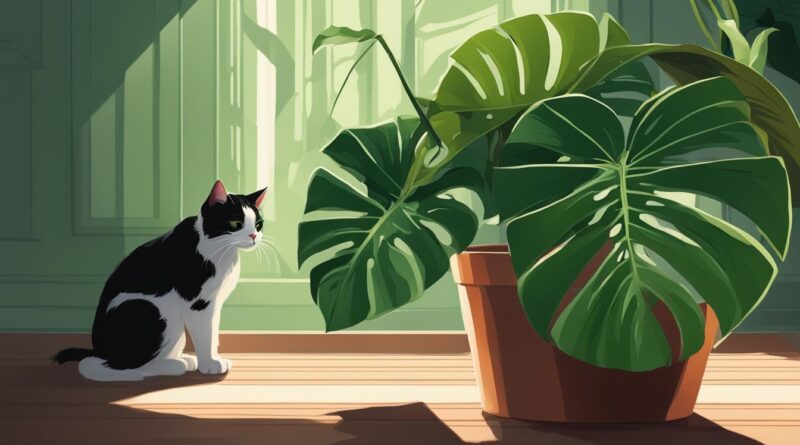Monstera Plant Safety: Is It Toxic To Cats?
Monstera plants are popular for their striking foliage and are a common sight in many homes. However, if you are a cat owner, you may be wondering whether these beautiful plants pose a threat to your feline friend. In this article, we will explore the safety of monstera plants around cats, their potential toxicity, and how to keep your pet safe and healthy.
Key Takeaways:
- Monstera plants are toxic to cats due to the presence of calcium oxalate crystals.
- Ingesting monstera can cause oral irritation, swelling, drooling, and vomiting in cats.
- While monstera poisoning is usually not fatal, immediate veterinary attention should be sought if a cat consumes any part of the plant.
- To prevent monstera poisoning, keep the plant out of reach, use deterrents, provide distractions, and consider cat-safe alternatives.
- Monitor your cat closely if they have been exposed to monstera plants and consult with a veterinarian for specific guidance.
Why Are Monstera Plants Toxic to Cats?
Monstera plants are a popular choice for indoor gardening enthusiasts, but pet owners need to be aware of the potential dangers they pose to their feline companions. The toxic nature of monstera plants stems from the presence of calcium oxalate crystals, which are sharp and pointed. When ingested by cats, these crystals can cause irritation and damage to the mouth, throat, and digestive system.
It is important to note that these toxins are present in all parts of the monstera plant, including the leaves, stems, roots, and unripe fruit. The plant has evolved these toxins as a defense mechanism against animals that may try to eat it.
While monstera poisoning is usually not fatal to cats, it can still cause discomfort and health issues if ingested in large quantities. Cats that come into contact with monstera plants may experience oral irritation, swelling, and drooling. In some cases, they may also vomit as a result of consuming the plant.
As responsible pet owners, it is crucial to keep monstera plants out of the reach of cats and monitor them closely to prevent ingestion. By understanding the dangers of monstera toxicity in cats, we can take steps to ensure the well-being and safety of our feline friends.

Symptoms of Monstera Poisoning in Cats
If you suspect that your cat has been exposed to a monstera plant, it’s essential to be aware of the potential symptoms of poisoning. By recognizing these signs early on, you can take prompt action and seek appropriate veterinary care.
The following are the common symptoms of monstera poisoning in cats:
- Oral Irritation: Cats may experience irritation in their mouth, which can manifest as excessive drooling, licking lips, or pawing at the face.
- Mouth, Lips, or Tongue Swelling: Swelling in these areas is another typical sign of monstera toxicity. It may cause discomfort and difficulty in eating or drinking.
- Drooling: Excessive drooling is a common reaction to ingesting toxic substances. If you notice your cat drooling more than usual, it could indicate monstera poisoning.
- Vomiting: Cats may vomit after consuming monstera plant parts. This is their body’s natural response to expel the toxic substances.
- Loss of Appetite: Cats with monstera poisoning may show a decreased interest in food or have a complete loss of appetite.
Severe cases of monstera poisoning can also lead to throat swelling, making it challenging for cats to breathe. If your cat exhibits any of these symptoms after being exposed to a monstera plant, it is crucial to seek immediate veterinary attention.
Quote:
“Being aware of the symptoms of monstera poisoning in cats can help pet owners take quick action and prevent further complications.” – Dr. Emily Reynolds, Veterinarian
| Symptoms of Monstera Poisoning in Cats | Actions to Take |
|---|---|
| Oral Irritation | Monitor closely and provide access to fresh water. Seek veterinary advice if the irritation persists or worsens. |
| Mouth, Lips, or Tongue Swelling | Contact a veterinarian immediately for evaluation and potential treatment. |
| Drooling | Observe the cat’s behavior and check for additional symptoms. Seek veterinary care if drooling is excessive or persists. |
| Vomiting | Remove access to the plant and monitor the cat for further signs of distress. Consult with a veterinarian if symptoms persist or worsen. |
| Loss of Appetite | Keep track of the cat’s eating habits and offer enticing, easily digestible food options. If the cat refuses to eat for an extended period or shows other concerning symptoms, consult with a veterinarian. |
Preventing Monstera Poisoning in Cats
When it comes to keeping cats safe from monstera toxicity, prevention is key. By implementing a few simple strategies, you can cat-proof your monstera plants and protect your furry friends from potential harm.
1. Keep Cats at a Distance
One effective way to prevent monstera poisoning in cats is to keep the plant out of their reach. You can achieve this by placing the plant on a high shelf or using a plant hanger. Another option is to create a physical barrier, such as a pet gate or fence, to prevent cats from accessing the plant.
2. Use Deterrents
To discourage cats from approaching your monstera plants, you can employ deterrents. Spraying cats with water when they get near the plant can help reinforce the message that it is off-limits. Additionally, you can use scents that cats dislike, such as citrus or vinegar, to create a natural deterrent around the plant.
3. Provide Distractions
Keeping cats entertained with plenty of attention, toys, and activities can divert their attention away from the monstera plant. Providing them with alternative sources of stimulation can reduce the likelihood of them exploring and potentially ingesting the plant.
4. Consider Cat-Safe Alternatives
If you’re concerned about the risks associated with monstera toxicity, consider opting for cat-safe plants as alternatives. There are numerous indoor plants that are non-toxic to cats, offering a beautiful and safe environment for both your feline companion and your green thumb.
Implementing these preventive measures will help ensure the safety of your cats and allow you to enjoy the beauty of monstera plants without worry. Remember to always consult with your veterinarian for specific guidance, and closely monitor your cats if they have been exposed to monstera plants.

Table: Cat-Safe Plants as Alternatives to Monstera
|———————|——————|
| Pothos | Spider Plant |
| Boston Fern | Areca Palm |
| Calathea | Christmas Cactus |
| Peperomia | African Violet |
| Baby’s Tears | Polka Dot Plant |
|———————|——————|
Conclusion
In conclusion, it is important for cat owners to be aware of the potential dangers of monstera plants and to take precautions to ensure their pets’ safety. While monstera plants are toxic to cats and can cause discomfort and health issues if ingested, they are usually not fatal. By keeping the plant out of reach, using deterrents, providing distractions, and considering cat-safe alternatives, cat owners can prevent ingestion and enjoy the beauty of monstera plants without putting their pets at risk.
Consulting with a veterinarian is always recommended for specific guidance on plant safety and monitoring cats closely if they have been exposed to monstera plants. It is better to err on the side of caution when it comes to the well-being of our furry friends. By prioritizing their safety and taking steps to prevent monstera poisoning, cat owners can create a harmonious environment where both pets and plants can coexist.
Remember, the joy of having houseplants should not come at the expense of our cats’ health. With proper care and attention, we can enjoy the beauty of monstera plants while ensuring the safety and well-being of our beloved feline companions.
FAQ
Is monstera toxic to cats?
Yes, monstera plants are toxic to cats. They contain calcium oxalate crystals that can cause oral irritation, swelling, drooling, and vomiting if ingested.
What are the effects of monstera on cats?
If a cat ingests any part of a monstera plant, it can experience oral irritation, swelling of the mouth, lips, or tongue, drooling, vomiting, and loss of appetite. In severe cases, the cat’s throat can swell, making it difficult for them to breathe.
How can I keep my cat safe around monstera plants?
To keep your cat safe, it is important to keep monstera plants out of their reach. This can be achieved by placing the plant on a high shelf, using a plant hanger, or creating a physical barrier. Using deterrents like spraying cats with water or using scents they dislike, such as citrus or vinegar, around the plant can also help.
What are some cat-friendly indoor plants I can consider instead of monstera?
There are several cat-safe alternatives to monstera plants that you can consider, including spider plants, Boston ferns, African violets, and catnip. These plants are non-toxic to cats and can still provide beauty and greenery to your home.
Should I seek veterinary attention if my cat has ingested monstera?
Yes, it is recommended to seek immediate veterinary attention if your cat has consumed any part of a monstera plant. While monstera poisoning is usually not fatal, it can cause discomfort and health issues, so it is important to have your cat assessed by a veterinarian.


